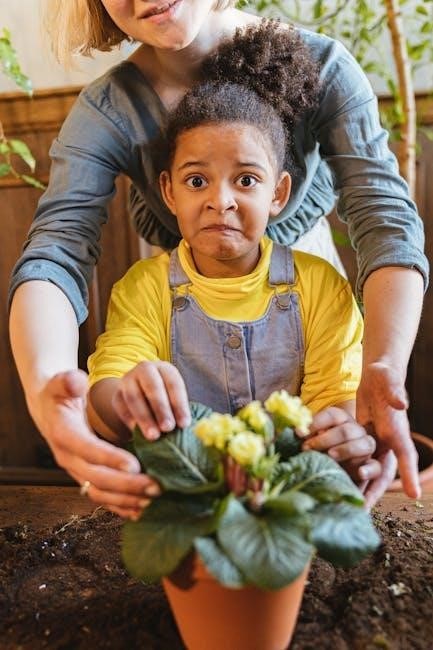This guide, written by Jon Young, Ellen Haas, and Evan McGown, offers a transformative approach to reconnecting people with nature through playful, curiosity-driven activities. Perfect for parents, educators, and mentors, it provides 54 engaging exercises designed to foster a deep sense of belonging to the natural world, while sparking excitement and wonder in learners of all ages. By embracing the coyote’s mentorship, the guide encourages exploration, creativity, and a meaningful connection with the environment.
Overview of the Guide
The Coyote’s Guide to Connecting with Nature is a comprehensive resource designed to help individuals of all ages reconnect with the natural world. Written by Jon Young, Ellen Haas, and Evan McGown, this second edition offers an expanded collection of activities, strategies, and insights. The guide is structured to inspire curiosity and creativity, fostering a deeper appreciation for nature. It includes 54 engaging activities tailored for various learning styles and age groups, making it accessible to parents, educators, and mentors. The book serves as both a field guide and a mentor’s manual, providing practical tools to design meaningful nature-based experiences. By embracing the coyote’s playful and adaptive nature, the guide encourages exploration, wonder, and a sense of belonging to the earth.
Key Themes and Objectives
The Coyote’s Guide to Connecting with Nature emphasizes the importance of fostering a deep, personal connection with the natural world. A central theme is addressing “nature-deficit disorder,” a term popularized by Richard Louv, which highlights the growing disconnection between humans and the environment. The guide aims to inspire curiosity, creativity, and a sense of wonder, encouraging individuals to explore and appreciate nature’s beauty. By embracing the coyote’s adaptable and playful nature, the guide promotes holistic development, including emotional, psychological, and physical well-being. Its primary objective is to empower parents, educators, and mentors with practical tools to help people of all ages reconnect with the earth and cultivate a lifelong love for nature.

The Coyote as a Mentor in Connecting with Nature
The coyote symbolizes adaptability and playful curiosity, inspiring a unique approach to nature connection. Its mentorship encourages exploration, creativity, and a deep, intuitive bond with the natural world.
The Role of the Coyote in Nature Connection
The coyote serves as a powerful symbol and mentor in fostering nature connection, embodying adaptability, resilience, and playful curiosity. Its intuitive relationship with the environment inspires learners to explore and engage with nature authentically. By adopting the coyote’s approach, individuals can cultivate a deeper sense of wonder, creativity, and belonging in the natural world. The guide leverages the coyote’s mentorship to encourage spontaneous discovery, helping people of all ages reconnect with the land and its rhythms. This mentorship model emphasizes observation, experimentation, and joy, creating a transformative experience that bridges humans and nature.
Principles of Coyote Mentoring
Coyote mentoring emphasizes fostering curiosity, playfulness, and intuitive learning in nature connection. The approach encourages learners to explore their surroundings with wonder, mirroring the coyote’s adaptability and resilience. Key principles include allowing nature to lead, promoting creativity, and nurturing a sense of belonging; The guide’s 54 activities are designed to spark discovery and engagement, enabling individuals to develop a deeper bond with the environment. By embracing the coyote’s playful and resourceful spirit, mentors create opportunities for meaningful interaction and learning. This approach shifts the focus from instruction to inspiration, empowering people to reconnect with nature on their own terms and at their own pace, fostering lifelong appreciation and stewardship.

The Science Behind Connecting with Nature
Connecting with nature reduces stress, improves mental clarity, and enhances well-being, as supported by research. The guide aligns with these principles, offering activities to reconnect people with nature.
The Benefits of Nature Connection for Humans
Nature connection fosters emotional well-being, reduces stress, and enhances mental clarity. It encourages physical activity, improving overall health, and nurtures creativity and problem-solving skills. By engaging with nature, individuals develop a sense of belonging, which boosts self-esteem and resilience. The Coyote’s Guide emphasizes these benefits, providing activities that spark curiosity and joy in exploring the natural world. Playful interactions with nature, as highlighted in the guide, promote a deeper understanding of ecosystems and our role within them. This connection not only enriches personal growth but also cultivates a lifelong appreciation for the environment, ensuring healthier, more balanced lives for individuals of all ages.
Nature-Deficit Disorder and Its Implications
Nature-Deficit Disorder, a term popularized by Richard Louv, highlights the growing disconnection between humans and the natural world. This phenomenon stems from reduced outdoor experiences, leading to mental, emotional, and physical challenges. The Coyote’s Guide addresses this issue by offering engaging activities that encourage nature exploration, fostering a sense of connection and wonder. Prolonged disconnection can result in increased stress, diminished creativity, and a lack of empathy for the environment. By reconnecting with nature, individuals can mitigate these effects, promoting healthier lifestyles and a deeper appreciation for ecosystems. The guide emphasizes the importance of reversing this trend, ensuring future generations can thrive physically, mentally, and spiritually through meaningful interactions with the natural world.
Activities for Connecting with Nature
The guide offers 54 engaging activities designed to reconnect people with the natural world, fostering curiosity, creativity, and a sense of belonging through playful exploration;
Types of Activities for Different Age Groups
The Coyote’s Guide offers a variety of activities tailored to different age groups, ensuring accessibility for children, teens, and adults alike. For younger children, the guide includes simple, playful exercises like nature scavenger hunts and sensory exploration games. Older kids and teens can engage in more complex activities, such as animal tracking, bird language interpretation, and wilderness survival skills. Adults are also encouraged to participate, with activities designed to reignite their connection to nature. The guide emphasizes adaptability, allowing mentors to modify activities based on age, skill level, and interests. This approach ensures that everyone can benefit from meaningful nature-based experiences, fostering a deeper appreciation for the natural world.
Designing Effective Nature-Based Learning Experiences
The Coyote’s Guide emphasizes the importance of creating immersive and engaging nature-based learning experiences. By focusing on hands-on activities, the guide encourages learners to step away from passive observation and instead actively participate in nature. Activities are designed to cater to different learning styles, whether through exploration, creativity, or problem-solving. The coyote’s role as a mentor highlights the value of curiosity and adaptability, making nature connection accessible and enjoyable. The guide also stresses the need to balance structured activities with open-ended exploration, allowing individuals to develop a personal connection with the natural world. This approach fosters a sense of wonder and belonging, making nature-based learning both meaningful and transformative.

The Role of Parents and Educators in Nature Connection
Parents and educators play a crucial role in fostering nature connection by encouraging exploration and nurturing curiosity, helping individuals develop a meaningful bond with the natural world.
How Parents Can Encourage Nature Exploration
Parents can foster nature exploration by creating opportunities for outdoor play, encouraging curiosity, and modeling a love for nature. They should provide tools like magnifying glasses and journals to enhance discovery. Setting aside time for family nature walks and allowing children to lead can deepen their connection. Emphasizing observation and questioning helps build critical thinking. Parents should also create a nature-friendly backyard, offering spaces for exploration and creativity. By embracing a mentorship role, similar to the coyote’s approach, parents can guide children in developing a lifelong appreciation for the natural world, making learning fun and immersive. This fosters emotional and cognitive growth.
Integrating Nature Connection into Educational Curricula
Integrating nature connection into educational curricula involves incorporating hands-on, outdoor learning experiences that align with academic standards. Educators can use the Coyote’s Guide as a versatile resource, blending nature-based activities with traditional subjects like science, art, and literature. The guide’s 54 activities encourage observation, creativity, and critical thinking, making it adaptable for both urban and rural settings. By designing lessons that emphasize exploration and discovery, teachers can help students develop a deeper understanding of the environment while fostering skills in problem-solving and collaboration. This approach not only enhances learning but also nurtures a sense of stewardship and connection to the natural world, preparing students for a lifetime of environmental awareness and appreciation.

The Impact of Nature on Children’s Development
Nature fosters creativity, critical thinking, and emotional well-being in children, while enhancing physical growth and nurturing a lifelong connection to the environment and its rhythms.
Emotional and Psychological Benefits
Connecting with nature through the Coyote’s Guide fosters emotional resilience, creativity, and a sense of wonder in children. By engaging in nature-based activities, kids develop problem-solving skills and confidence. The guide emphasizes the importance of curiosity-driven exploration, which enhances cognitive development and emotional well-being. Nature connection reduces stress and anxiety, promoting a calm and focused mindset. It also encourages empathy and compassion for the environment, fostering a deeper sense of belonging. These experiences help children build a positive self-image and develop emotional intelligence, essential for navigating life’s challenges. The Coyote’s mentorship approach creates a nurturing environment where children can thrive emotionally and psychologically, supported by the beauty and simplicity of nature.
Physical and Cognitive Development Through Nature
Engaging with nature, as outlined in the Coyote’s Guide, significantly enhances both physical and cognitive development in children. Outdoor activities promote motor skills through exploration and play, while fostering creativity and critical thinking. Nature-based learning encourages observation, pattern recognition, and problem-solving, which sharpen cognitive abilities. The guide’s emphasis on hands-on experiences, such as tracking and wildlife observation, enhances spatial awareness and memory. These activities also stimulate curiosity and creativity, laying a strong foundation for academic success. By integrating nature into daily routines, children develop a holistic understanding of the world, improving their physical agility and mental sharpness while fostering a lifelong appreciation for the natural environment.
Embrace nature’s wisdom and foster a deeper connection with the world around you. Inspire others to explore, learn, and grow through meaningful outdoor experiences for a better tomorrow.
Final Thoughts on the Importance of Nature Connection
Nature connection is vital for fostering resilience, creativity, and well-being, as highlighted in the Coyote’s Guide. By embracing the coyote’s mentorship, individuals of all ages can cultivate a deeper sense of belonging to the natural world. The guide’s second edition offers comprehensive activities designed to spark curiosity and promote meaningful engagement with the environment; Addressing Nature-Deficit Disorder, this resource emphasizes the emotional and psychological benefits of reconnecting with nature. It serves as an invaluable tool for parents, educators, and mentors, providing practical ways to integrate nature-based learning into daily life. Let this guide inspire you to embrace the outdoors and nurture a lifelong connection with the world around you.
Encouraging Others to Embrace Nature
Inspiring others to reconnect with nature can have a profound impact on their well-being and relationship with the environment. By sharing the Coyote’s Guide principles, mentors and educators can foster a sense of wonder and curiosity in others. Simple acts, such as storytelling or leading nature-based activities, can spark interest and engagement. The guide’s emphasis on playful, hands-on experiences makes it easier for people of all ages to embrace the outdoors. Encouraging others to explore nature not only benefits individuals but also promotes a collective appreciation for the natural world, fostering environmental stewardship and a deeper connection to the world around us.
